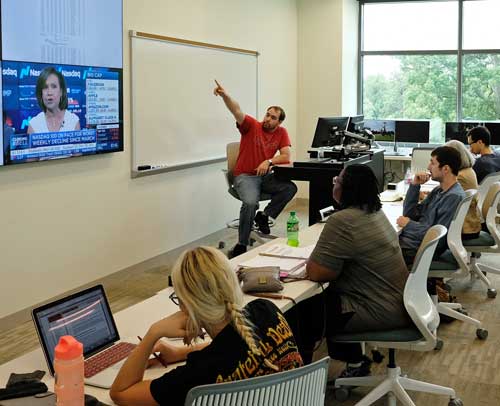Develop a Foundation in Information Systems.
Information systems technologists think strategically about selecting, deploying and utilizing computer-based information systems for organizational efficiency and competitive advantage. This involves understanding IT leadership, project management, and current trends in technology in order to become better business managers and end-users of technology.
 The UMSL Ed G. Smith College of Business is accredited by the world’s premier business school accrediting organization, the Association to Advance Collegiate Schools of Business, in both business and accounting.
The UMSL Ed G. Smith College of Business is accredited by the world’s premier business school accrediting organization, the Association to Advance Collegiate Schools of Business, in both business and accounting.
Program type:
Major, BSBA
Format:
On-Campus, 100% Online
Take the next step
Request more information below:

Bachelor of Science in Business Administration -
Information Systems & Technology Emphasis
The BSBA, Information Systems & Technology Emphasis degree is a 120-credit-hour program that requires at least 48-credit hours be filled with business courses, of which a minimum of 21-credit hours need to be taken in Information Systems & Technology courses. The program is offered three ways: in-person; fully online; and in a hybrid format.
The core business classes include financial and managerial accounting, legal environment of business, information systems concepts, business analytics and statistics, supply chain management, financial management, management and organizational behavior, marketing and strategic management. Once you’ve completed required courses, you can customize your degree with business electives, even selecting a minor, if you choose.
Outcomes and Career Outlook
Throughout the program, students will gain both core business skills and an overview of current Information Systems & Technology competencies including Business Intelligence, Cybersecurity and the management of disruptive IT, such as AI. Students will be enabled to become more effective managers by understanding the interface with IT managers and the alignment of business plans with IT plans.
Employment of Database Administrators is projected to grow up to 10% to 2029, with a median annual salary of $96,710, according to wage and employment data from the U.S. Bureau of Labor Statistics.
117,450+
10
Career Opportunities
- Application Analyst
- Business Analyst
- Data Administrator
- Data Analyst
- Data Governance
- Database Administrator
- Database Architect
- Database Consultant
- Database Developer/Designer
Emphasis Plan of study
All business majors must meet the general education requirements of the university in addition to completing degree-specific curriculum requirements.
Review Full Degree Requirements
Non-Missouri Residents: Prospective students are responsible for reviewing the UMSL state authorizations page to see if this program is offered in their state throughout their program and to review the licensure or certification requirements for the state in which they reside.
Student organizations
Make new friends and learn new skills by joining one of our Recognized Student Organizations. Here are several opportunities you may be interested in as a business administration, information systems and technology emphasis major:
- Information Technology and Cybersecurity Club
- IS Mentoring Club
- Student Government Association
- Associated Students of the University of Missouri
Internship opportunities and undergraduate research
The Career and Internship Program at the UMSL College of Business Administration will help prepare you with the real-world experience to hit the ground running when you get a job. We also encourage majors in accounting to participate in Undergraduate Research and Scholarship to innovate and collaborate with leaders in your field.
Honors College
The UMSL Honors College is a certificate program that can be paired with any major without adding extra classes or extending time to graduate. Classes in the Honors College are seminar-style, meaning that they are based in reading, writing, discussion, and critical thinking. This unique class format fosters an intellectual climate centered around democracy, civility and academic excellence.








